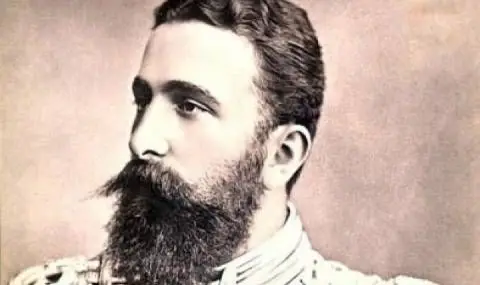On August 25, 1886, Prince Alexander I abdicated the throne.
After the counter-coup, organized by Stefan Stambolov and lieutenant colonel Sava Mutkurov, the regency was formed and a provisional government was formed.
The removal of the prince causes a split in the Bulgarian army and society.
Stefan Stambolov and his supporters return the prince, but he no longer has the support of Russia and the other great powers. Prince Alexander I of Battenberg died on 17 November 1893 in Graz, Austria. He is buried in the center of Sofia in a beautifully crafted small mausoleum.
Prince Alexander I of Battenberg was the first Bulgarian ruler after liberation from Ottoman rule. He was elected by the Great National Assembly on April 17, 1879 with a full majority and rejection of the other two candidacies of Waldemar Datski and Henrich Reuss.
Alexander Battenberg is the nephew of the Russian empress and godfather of the tsar-liberator Alexander II. He was born on April 5, 1857 in Verona, Italy. He is the son of the Austrian general Alexander von Hesse Darmstadt and the Polish countess Julia von Hauke. He received a good education at the Dresden Military School. He took part in the Russo-Turkish War of 1877-1878.
On June 26, 1879, in Tarnovo, Prince Alexander I took a solemn oath before the Great National Assembly. The Great Powers confirmed the election and at the beginning of August, according to the Treaty of Berlin, the Sultan confirmed it with a firman as Prince of Bulgaria.
The young monarch is dissatisfied with the Tarnovo constitution, which limits his rights. The struggle between liberals and conservatives creates uncertainty in the country. On June 5, 1879, Battenberg appointed the first government headed by Todor Burmov, consisting only of conservatives. However, the liberals won the parliamentary elections.
The prince does not wish to form a liberal government. Dissolves the National Assembly and appoints a new government of conservatives headed by Metropolitan Kliment (Vasil Drumev). The new parliamentary elections have been won again by the liberals. Now the prince gave way and on March 24, 1880 appointed the first liberal government with Prime Minister Dragan Tsankov.
The prince's contradictions with the liberals deepened and became insurmountable when Petko Karavelov became the head of the government (November 28, 1880).
On April 27, 1881, the prince, with the help of the Minister of War Casimir Ernroth, carried out a coup d'état, dismissing the government and dissolving the parliament. On May 11, he announced his demands: powers for a 7-year term, building new state institutions and amending the constitution after the term expired.
The credentials were voted on July 1, 1881 by the Great National Assembly. But soon the country fell into a new internal crisis due to the conflict between Bulgarians and Russians in the administration. On June 23, 1882, the executive power was assumed by gen. Leonid Sobolev, sent by the Russian government.
At the beginning of 1883, the conservatives went into opposition. On September 6, 1883, the Tarnovo constitution was restored and the powers ended. However, these actions of the prince make him an undesirable person for Russia, as they limit its influence in Bulgaria.
The Union of September 6, 1885 was proclaimed in his name. He became a key figure and became the ”prince of Northern and Southern Bulgaria”, entering Plovdiv triumphantly.
Bulgaria seeks international recognition of the Union. The position of Alexander III is for ”Union, but without Botenberg”. England unofficially supports the Union, but Austria-Hungary incites Serbia to attack Bulgaria.
Prince Alexander I of Battenberg emerged as the first commander-in-chief in the new Bulgarian history. The Serbian-Bulgarian war of 1885 ended with victory and a worthy defense of the Union.
